San Francisco, CA
'I am the change.' Facing tough reelection, London Breed says she's still what San Francisco needs
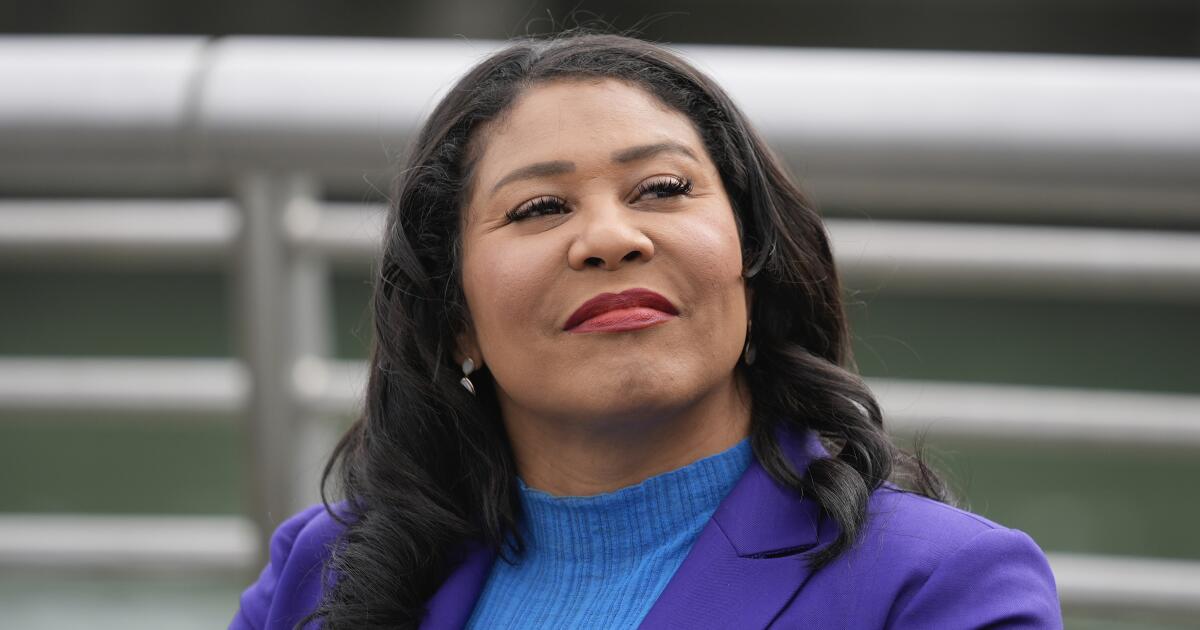
If there’s anything Mayor London Breed has learned in office, it’s that compassion has its limits.
So when she talks about her steady tack right in recent years on issues such as retail crime and homelessness, she’s direct and unapologetic. Sitting at the helm of one of America’s most celebrated cities and trying to keep that city on course, she said, has opened her eyes to some hard truths. Among them: That without guardrails, there are people who will take advantage of San Francisco’s generous spirit and behave in ways that drag the city down.
“We’ve gone too far in just letting people get away with things,” Breed said. “And as a result, people have been getting away with things.”
Breed, 50, made history six years ago when she became the city’s first Black female mayor. She was president of the powerful Board of Supervisors when then-Mayor Ed Lee died of a heart attack in December 2017. She won a special election to fill his seat the following June and was elected to a full term in 2019.
She’s now fighting to keep her seat in November against four other high-profile Democrats, three of them wealthy white men. This time, her greatest political threat isn’t coming from the left. Instead, the challengers with the most traction are two fellow moderates who’ve criticized Breed for not doing enough to rid the city of the tent encampments and open drug dealing pervasive in certain neighborhoods or to speed its recovery from the economic malaise still lingering from pandemic-related shutdowns.
Breed reflected on her tenure during a lengthy sit-down interview with The Times last month outside a café at the Transamerica Pyramid. The iconic building reopened in September after an extensive renovation that some see as as a symbol of downtown’s nascent comeback.
San Francisco Mayor London Breed, left, and Los Angeles Mayor Karen Bass are the first Black women to lead their cities.
(Josh Edelson / For The Times)
Breed has never been a bleeding-heart progressive, despite San Francisco’s liberal reputation. But the Breed of six years ago was more open to experimenting with a progressive reformist agenda when it came to solving intractable issues such as addiction and poverty. That included promoting “safe injection” sites — essentially sanctioned, supervised illicit drug use — to counter the staggering toll fentanyl was taking on the city’s homeless population, and encouraging police to form better relationships with residents in marginalized communities.
In the last two years, by contrast, she has become a leading voice in a statewide movement to crack down on homeless people and addicts who refuse shelter or treatment. And she successfully championed two local ballot measures that bolster police surveillance powers and require drug screening and treatment for people receiving county welfare benefits who are suspected of drug use.
Although some people dismiss her policy shifts as a calculated political ploy, Breed said her decisions are about personal growth, fueled by what she sees as a lack of accountability that has allowed social problems to fester.
“San Francisco has never abandoned its values of compassion and second chances,” said Breed, wearing one of her signature suits, this one a bold cerulean blue. “But I think that before the pandemic, we were headed in a direction with criminal justice reform, police reforms, and it went too far. And when I say it went too far, if you commit a crime, you have to be held accountable somehow.”
Born into poverty in the Western Addition, at the time one of San Francisco’s toughest neighborhoods, Breed doesn’t shy from political combat. She was raised by her grandmother, lost a sister to a drug overdose and has a brother who is serving time in prison for robbery and other charges. Throughout her career, she has fought and won against critics who doubted her.
“London will fight back. She’ll snap. She’ll show you she’s from Plaza East projects,” said James Taylor, a political science professor at the University of San Francisco and author of “Black Nationalism in the United States: From Malcolm X to Barack Obama.”
“She’ll go street on you in a second. That’s why the men who are running against her have to be careful.”
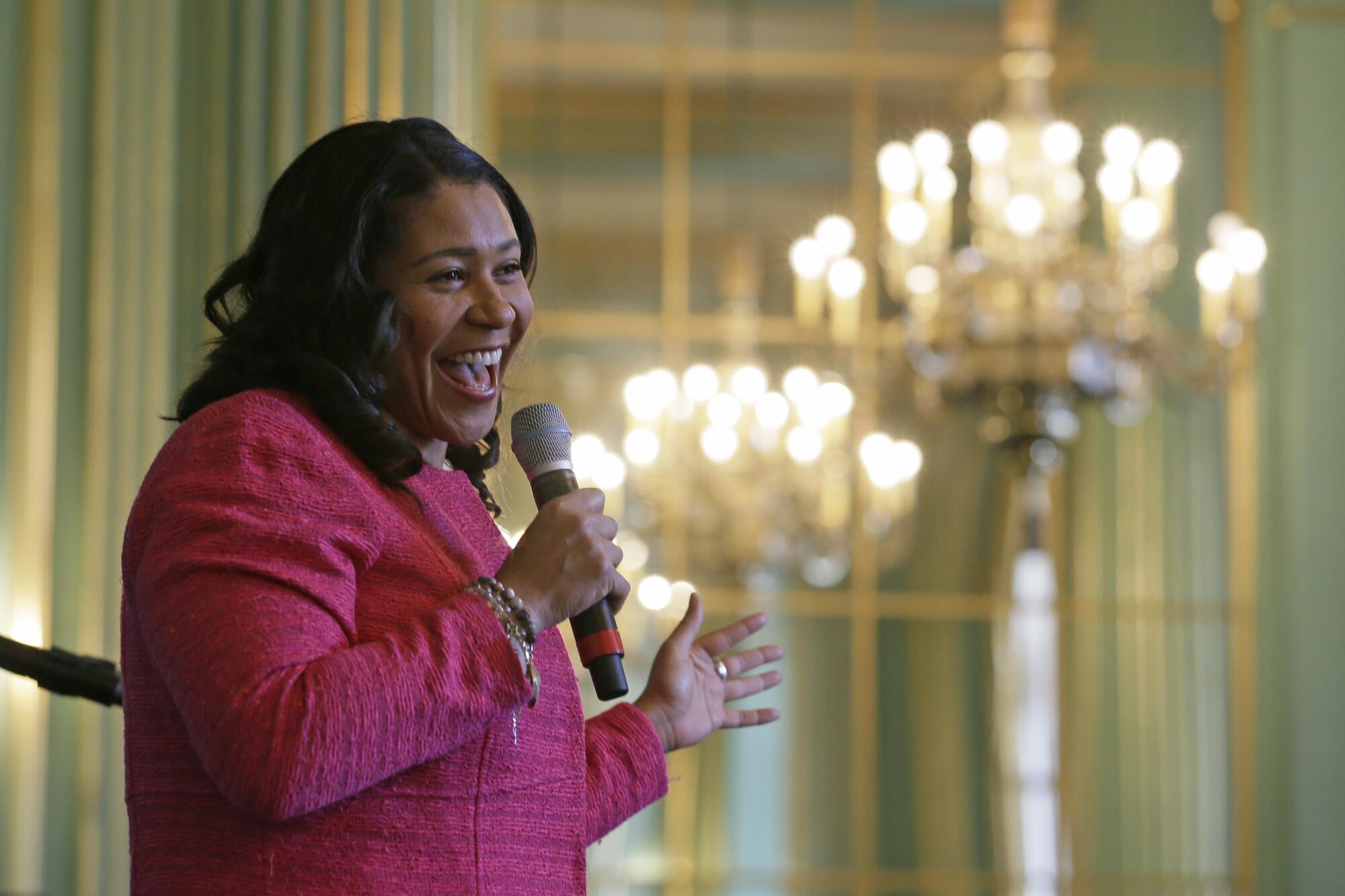
“London will fight back,” says University of San Francisco professor James Taylor. “She’ll go street on you in a second. That’s why the men who are running against her have to be careful.”
(Eric Risberg / Associated Press)
Breed’s evolution started with the COVID pandemic.
She was celebrated, initially, for her decisive response when she became the nation’s first big city mayor to declare a coronavirus state of emergency, followed soon after by a citywide lockdown. The move is credited with saving thousands of lives and keeping San Francisco’s death rate relatively low.
But a year later, she was on the defensive.
The combination of remote office work and prolonged restaurant and bar closures decimated downtown street life. And parents fumed as city schools remained closed for months longer than public schools in most districts in the nation.
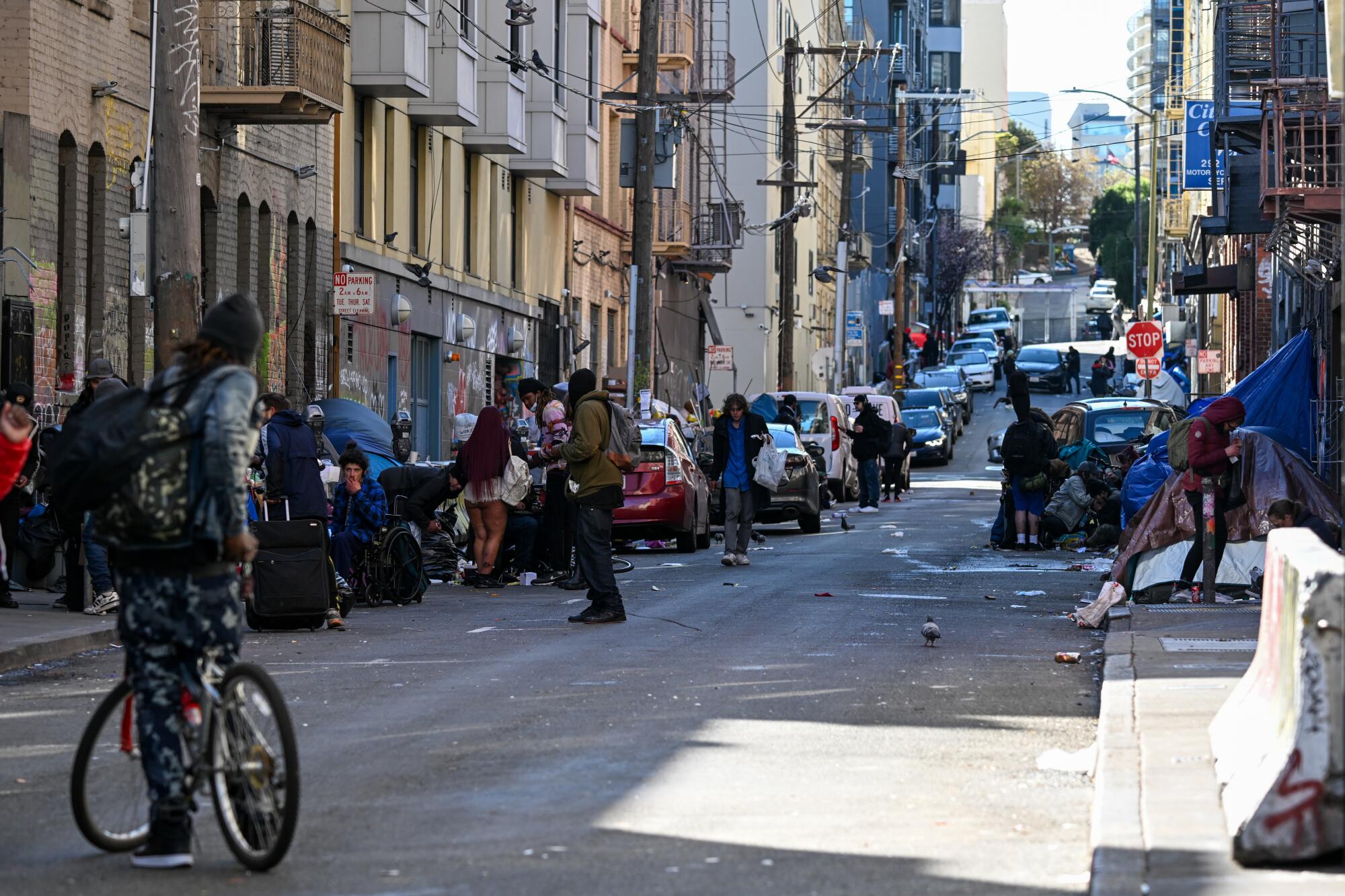
Homelessness and rampant drug use have been a major campaign issue in San Francisco’s mayoral race.
(Tayfun Coskun / Getty Images)
Sprawling homeless encampments took root in portions of the city once lively with workers and tourists, spilling trash and needles onto the sidewalks. People overdosed in the streets, unattended. Videos of smash-and-grab retail crimes and auto theft went viral, giving ample opportunity for right-wing media pundits to use San Francisco as an urgent warning against electing Democrats.
“People were at home. They couldn’t travel. They couldn’t go on vacation. Their kids were with them all the time. The issues around government and government functioning, that was a real pain point,” said Nancy Tung, chair of the San Francisco Democratic Party. “Things were broken, and you knew it.”
Breed said she grew tired of seeing videos of people flagrantly grabbing merchandise from Walgreens and Louis Vuitton, as if it were their right, and of hearing from police that they didn’t have the tools they needed to fight crime. She was sick of battling supervisors and community activists who disparaged her tactics as inhumane and short-sighted when she called for giving police more authority to disperse homeless people and arrest drug users.
Her frustrations erupted in 2021, when during a news conference to announce a crackdown on crime in the drug-infested Tenderloin, Breed proclaimed it was time to be “less tolerant of all the bulls— that has destroyed our city.”
During her sit-down with The Times, Breed said her decision to declare a state of emergency in the Tenderloin stemmed from a visit a week earlier with families and local business owners. One mom told Breed how hard it was to raise her son in the neighborhood. Business owners shared their struggles running their shops amid break-ins and other crime.
“My heart broke,” Breed recalled. “They were tired of living like that. And, more importantly, they were hoping that we could help.”
Her emergency declaration enabled the city to cut through bureaucratic red tape to more quickly move people off the streets and into shelter and services. Separately, she pledged to assign more officers to the neighborhood.
Breed also took her grievances to voters.
In June 2022, voters ousted progressive Dist. Atty. Chesa Boudin over frustrations that he was focused more on on sentencing reform and addressing the root causes of crime than on actually prosecuting criminals.
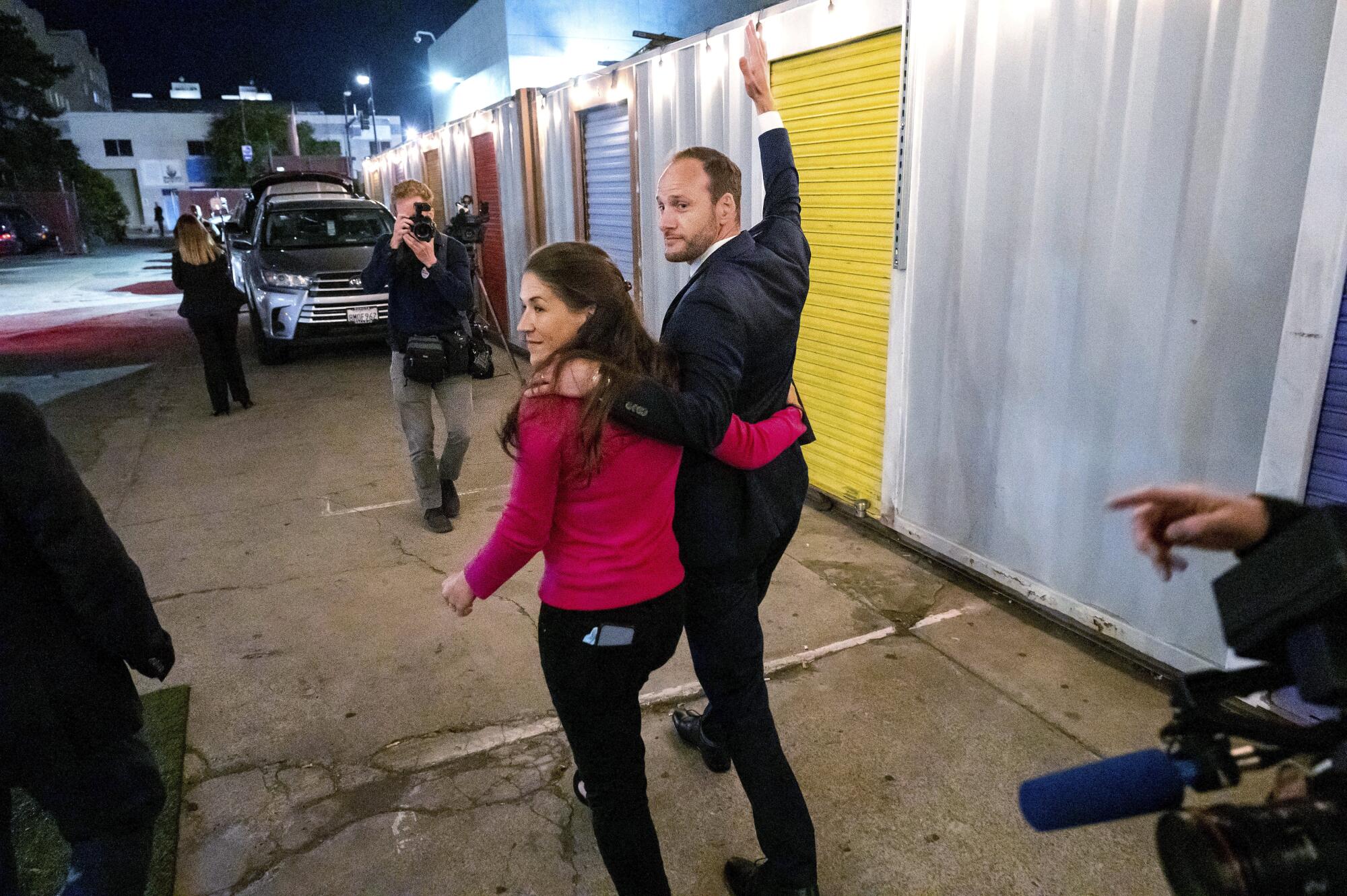
Dist. Atty. Chesa Boudin and his wife, Valerie Block, leave an election night gathering after Boudin’s recall.
(Noah Berger / Associated Press)
Breed didn’t endorse the recall, but she and Boudin had traded barbs in the press over who was to blame for rising crime. After the recall, Breed appointed Brooke Jenkins, a more traditional law-and-order prosecutor who had quit Boudin’s office and worked on the campaign to remove her former boss from office. Five months later, Jenkins was elected to fill the rest of Boudin’s term.
Breed continued her crusade to push San Francisco toward the political center last spring, when voters approved the ballot measures she sponsored to bolster police powers and increase oversight of people receiving county benefits. During the summer, she applauded a pivotal U.S. Supreme Court ruling that allowed cities to more aggressively enforce laws against homeless people camping on public property. On the heels of the decision, she has launched an aggressive effort to clear tent encampments, leading to hundreds of arrests.
“Like a good politician, perhaps her best fuel this last year or two has been reading where the electorate is at,” said Jason McDaniel, a political science professor at San Francisco State University. “Voters have become fed up with this. There’s just no patience for a more systemic, root-cause kind of approach.”
The question before voters is whether they see Breed’s efforts as too little, too late.
“There’s no mayor that has overseen a steeper decline in our city’s history than London Breed,” said challenger Mark Farrell, a venture capitalist and former supervisor and interim mayor who is running a formidable campaign to replace Breed in November.
“She had her chance. It is time to turn the page on this mayor and all of the City Hall insiders,” said challenger Daniel Lurie, a nonprofit executive and heir to the Levi Strauss fortune, who is also considered a front-runner.
Like Breed, both Lurie and Farrell are moderate Democrats by San Francisco standards. And like Breed, they say they want to clear out tent encampments and end rampant drug dealing in the Tenderloin and South of Market neighborhoods. They’ve focused their pitch to voters on revitalizing the economy and reviving downtown.
Both blame Breed for the city’s continued struggles, and they argue she is undeserving of another four years in office.
Voting for Breed, Lurie said in a recent interview, would be like “getting onto a plane with a pilot that you know has crashed the plane over and over again.”
Breed’s supporters stand by her, hailing her as a homegrown champion who has led the city during a period of crisis that included a global pandemic and the insidious rise of fentanyl.
“They’re just going to blame everything on her, because she’s the mayor, and they are going to take whacks on her day and night,” state Sen. Scott Wiener (D-San Francisco) said. “I am 100% confident none of them would have done better than London Breed on these massive issues that go well beyond San Francisco.”
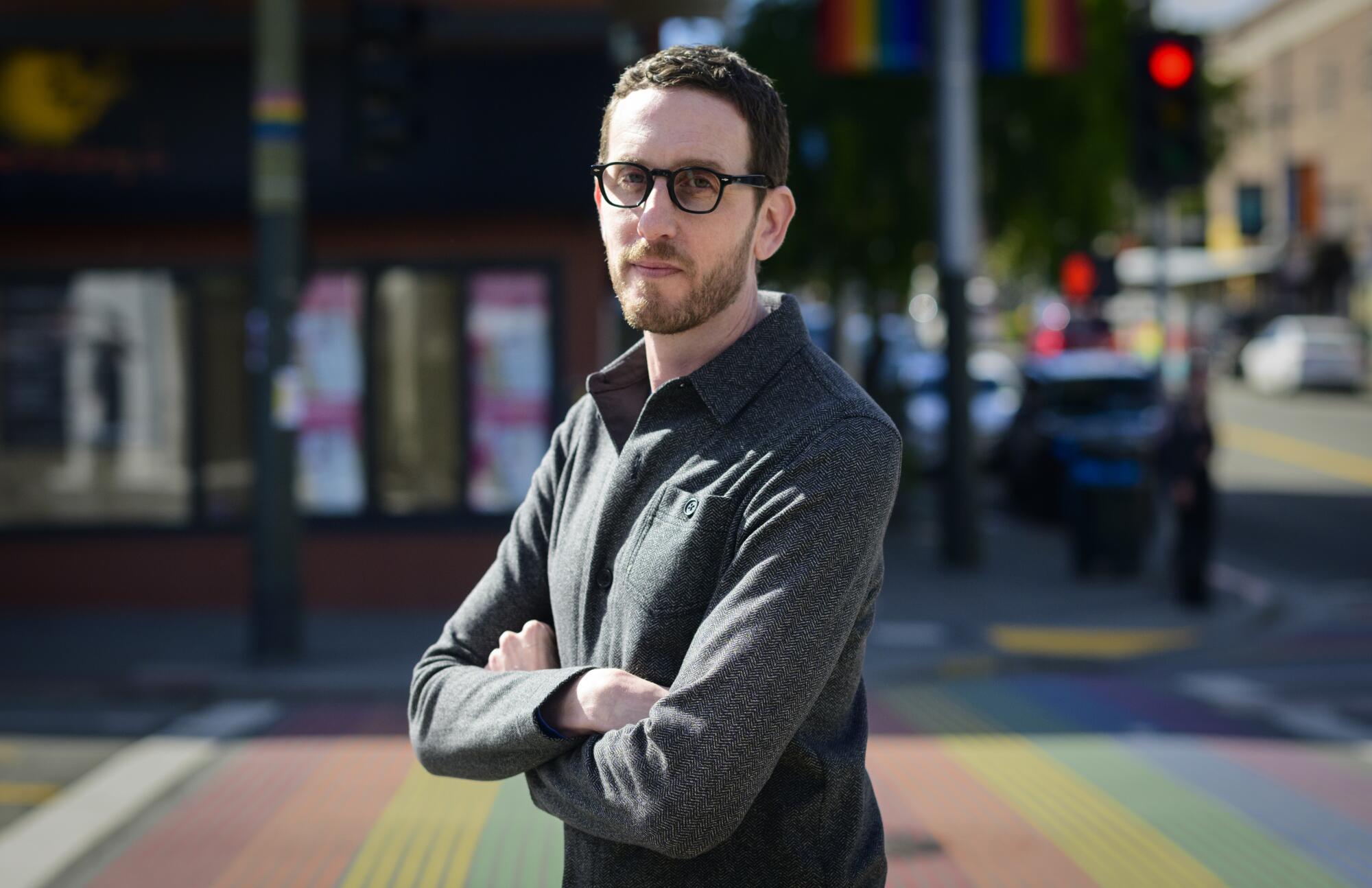
“She sees the big picture on housing,” state Sen. Scott Wiener says of London Breed. “And she’s willing to spend political capital and take heat and take risks.”
(Josh Edelson / For The Times)
Wiener disagrees with Breed on some of her criminal justice policies, but said she’s the only candidate who will prioritize the construction of thousands of homes in a city desperate for affordable housing.
“She sees the big picture on housing,” Wiener said. “And she’s willing to spend political capital and take heat and take risks.”
Breed also has the support of the San Francisco Democratic Party, whose leader, Tung, recalled another time when Breed took a bold risk: shutting down the city during the pandemic.
“She kept our city safe,” Tung said. “She got people vaccinated.”
Speaking to the Noe Valley Democratic Club at a neighborhood pub last month, Breed listened as members shared their frustrations. One man asked why they should vote for Breed given the city’s problems. Another complained that police didn’t do anything after his home was burglarized.
Breed listened intently as they detailed their grievances. And in her responses, she was candid about mistakes.
“After the pandemic, it’s like, man, crime was out of control,” she said. “I’ll be very honest, we weren’t prepared.”
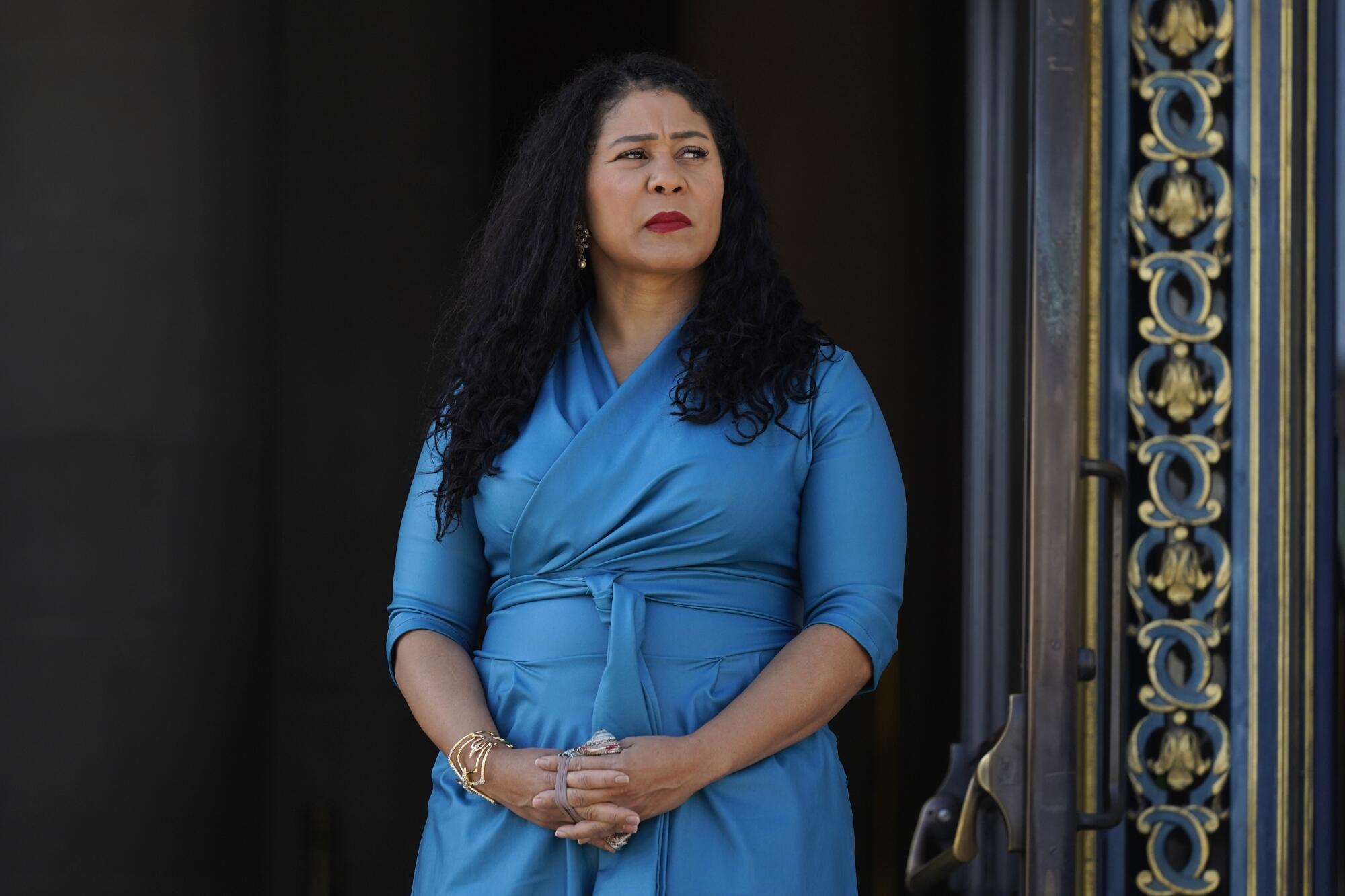
“We’ve gone too far in just letting people get away with things,” says San Francisco Mayor London Breed. “And as a result, people have been getting away with things.”
(Eric Risberg / Associated Press)
She touted her efforts to forge change, and smiled as she talked about enlivening downtown with night markets and music festivals on the waterfront.
As a result, Breed said, crime is receding. Homicides are down 40% compared with last year, according to the Police Department’s crime dashboard, and robberies have fallen 23%. This month, Breed announced 60% fewer tents across the city.
For those who want to see a better day in San Francisco, Breed said, “I am the change.”
The city’s ranked-choice voting system — which allows voters to choose several candidates and rank them in order of preference — makes it difficult to call out a clear leader in the mayoral race. Recent polls show Breed with a slight — but not decisive — advantage.
Still, Breed doesn’t give up easily. She said she’d like to be known as the mayor who guided San Francisco “through unprecedented crisis after crisis” and got the city “out to the other side.”
She is convinced she can get there. She just wants another four years.

San Francisco, CA
San Francisco supervisor presses city departments to clean up Sixth Street

Over the last few months, San Francisco has been cracking down on open-air drug markets that have taken root on several street corners in the city’s South of Market and Tenderloin neighborhoods.
Some progress has been made, but Supervisor Matt Dorsey, who represents South of Market, is fed up with what’s happening on one particular street in his district: Sixth Street.
On Sixth Street on any given day, one can see some of the city’s issues with drug use, drug dealing and mental health all out in the open.
Dorsey is pressing city departments to take swift action.
“Just on the Sixth Street corridor, if we were to affect 100 arrests per night with an eye toward making those life-saving, medically-appropriate interventions, getting people into detox and drug treatment,” he said.
Dorsey has sent a formal letter of inquiry to all city departments that are responsible for law enforcement, public safety and public health to ask what they would need to make his 100-arrests-per-night proposal a reality.
He acknowledges there has been improvement on drug use and sales on several street corners in SoMa and the neighboring Tenderloin, but not on Sixth Street.
He said the issues on Sixth Street have not just remained the same. He said they’ve gotten worse
“This is not COVID-19 or something that we can expect to get better once we get over the hump,” he said. “The reality is that we are now in the era of synthetic drugs.”
For that reason, he believes mandated treatment after an arrest is needed.
But not everyone agrees, in part, because right now there is a lack of treatment available in the city.
“We have very little treatment for women, for example,” Coalition on Homelessness Executive Director Jennifer Friedenbach said. “We have very little for the Spanish-speaking population. We have literally no free trauma therapy that’s extensive. These are the places that have been identified as what we really need to do to address the crisis. Criminalization isn’t even on the list.”
Freidenbach said the city also needs some kind of detox facility.
She and Dorsey seldom agree on many issues, but they both said they have high hopes for Mayor-elect Daniel Lurie. Dorsey said he’s on the same page as a lot of Lurie’s public safety proposals, and Friedenbach said Lurie has a long history of funding projects aimed as solving the root causes of problems in the city.
San Francisco, CA
San Francisco police union pushes for SFPD to rejoin FBI Joint Terrorism Task Force

SAN FRANCISCO (KGO) — In the wake of the attack in New Orleans, the San Francisco Police Officers Association is asking for SFPD to reinstate its partnership with the FBI Joint Terrorism Task Force.
The partnership was suspended in 2017 because of pressure from civil liberties advocates.
The POA posted on X: “The SFPD should rejoin the joint terrorism task force to work with all of our law enforcement partners in keeping the people who live, work and visit San Francisco safe.”
“We put out the tweet because what happened in New Orleans. Nobody wants to see that happen again. We have some high-profile events happening here in the city. And we want to make sure we have every available piece of information that is going to keep the public safe,” said Lt. Tracy McCray with the SF Police Officers Association.
McCray says there will be a lot of eyes on San Francisco because of upcoming events like the J.P. Morgan Health Care Conference.
“That’s going to be really huge and after what happened in New York with the CEO killed,” McCray said.
In February there’s the Chinese New Year Parade and the NBA All-Star Game.
“That’s a huge event. Security is paramount,” McCray said.
New Orleans attack latest: 14 killed; Police don’t believe any other suspects involved, FBI says
The San Francisco Police Department pulled out of the Joint Terrorism Task Force in 2017 during the Trump Administration.
SFPD faced pressure from civil liberties advocates and members of the Muslim community concerned that the FBI and SFPD would target undocumented immigrants and Muslim residents. Law enforcement leaders say SFPD and the FBI share information now but that more needs to be done.
“Even though there is info that is shared with the department, it’s different from actually being part of this joint effort. This task force where we would actually have someone dedicated to being on that task force,” McCray said.
“To not have SFPD involved in it, as a member of it, is ludicrous,” said former FBI Agent Rick Smith. He says SFPD needs to be part of the task force.
“It’s a coordinated group that is formed to deal with situations just like what is being dealt with today in New Orleans. It’s essential to have a coordinated effort and one command post when something like this happens,” Smith said. “To be safe, you need law enforcement to talk together in realtime to deal with these things.”
MORE: Safety experts detail ways to protect SF’s ‘entertainment zones’ in wake of New Orleans attack
Local leaders say what happened in New Orleans is a wake up call.
“We have to double down on our relationships with federal partners like the joint federal task force. I’m going to do everything I can as a member of the Board of Supervisors to support that,” said SF Supervisor Matt Dorsey.
A San Francisco Police Department spokesman said it’s time for rethink its membership in the JTTF.
It also issued a statement saying that officers are on heightened alert and are prepared to respond to any incident that may occur. SFPD will be fully staffed for all major events in the coming weeks and months.
The decision to reinstate the partnership between SFPD and the FBI’s Joint Terrorism Task Force depends on the SF Police Commission.
Copyright © 2025 KGO-TV. All Rights Reserved.
San Francisco, CA
EXCLUSIVE: SF supervisor calls for 'compulsory detox and treatment' for drug users

SAN FRANCISCO (KGO) — The quarter-mile stretch of 6th Street in San Francisco’s South of Market neighborhood has long struggled with open air drug usage, but Supervisor Matt Dorsey says it’s only getting worse.
It’s why he’s calling for mass-arrests of drug users to put them into “compulsory detox and treatment” and off the streets.
Dorsey first told ABC7 News about his request to the city agencies that deal with these issues to come up with an enforcement plan in order to solve drug-related “lawlessness” on the streets.
“Historically, most of the work that we’re doing is focused on drug dealers, and I think that’s something that needs to continue, but we also need to be making criminal justice interventions in public drug use,” he said. “We do need to be making arrests of drug users with an eye toward making sure that any criminal justice intervention we make is a medical and life saving intervention.”
MORE: California’s Prop 36 now in effect, increasing penalties for certain theft and drug crimes
The San Francisco Police Department estimates that at least 200 people “loiter and use drugs” in the area on a nightly basis. Dorsey wants to see no fewer than 100 arrests per night going forward.
It’s not the first time the city has tried to use the criminal justice system to get those with substance use disorders off the streets and into treatment. In 2023, Mayor London Breed directed SFPD to make more drug-related arrests.
Dr. Tyler TerMeer, CEO of the San Francisco AIDS Foundation, is critical of this approach, saying it does not address the root causes of substance abuse.
“Decades of research have shown that criminalizing people for their health conditions or circumstances perpetuates harm rather than fostering recovery. Forced treatment under the threat of incarceration undermines trust in health services and disproportionately impacts marginalized communities,” TerMeer said in a statement to ABC7 News. “What San Francisco truly needs is increased investment in overdose prevention services, voluntary treatment programs, and supportive housing. These approaches save lives, reduce public health crises, and strengthen our city.”
MORE: San Francisco launches new ‘Living Proof’ health campaign to encourage drug addiction treatment
Dorsey believes the city’s longtime harm reduction approach is no longer working. And as a former addict himself, it’s personal.
“What may have worked in the heroin era is not working in the fentanyl era. We are facing drugs that are deadlier than ever before in human history. And we’re seeing levels of addiction driven lawlessness that we have never seen even in a city that has taken a permissive approach to drug use in years past,” he said.
When asked what this will cost, Dorsey did not provide specifics but said San Francisco cannot afford to ignore this problem.
Dorsey’s letter of inquiry asks five different agencies to come up with a plan for large-scale arrests and involuntary holds within the next 30 days. It is directed to the following agencies: San Francisco Police Department, San Francisco Sheriff’s Office, San Francisco Fire Department EMS Division, San Francisco Department of Public Health, and San Francisco District Attorney’s Office.
Copyright © 2025 KGO-TV. All Rights Reserved.
-

 Business1 week ago
Business1 week agoOn a quest for global domination, Chinese EV makers are upending Thailand's auto industry
-

 Health6 days ago
Health6 days agoNew Year life lessons from country star: 'Never forget where you came from'
-
/cdn.vox-cdn.com/uploads/chorus_asset/file/24982514/Quest_3_dock.jpg)
/cdn.vox-cdn.com/uploads/chorus_asset/file/24982514/Quest_3_dock.jpg) Technology6 days ago
Technology6 days agoMeta’s ‘software update issue’ has been breaking Quest headsets for weeks
-

 World1 week ago
World1 week agoPassenger plane crashes in Kazakhstan: Emergencies ministry
-

 Politics1 week ago
Politics1 week agoIt's official: Biden signs new law, designates bald eagle as 'national bird'
-

 Business3 days ago
Business3 days agoThese are the top 7 issues facing the struggling restaurant industry in 2025
-

 Politics1 week ago
Politics1 week ago'Politics is bad for business.' Why Disney's Bob Iger is trying to avoid hot buttons
-

 Culture3 days ago
Culture3 days agoThe 25 worst losses in college football history, including Baylor’s 2024 entry at Colorado















